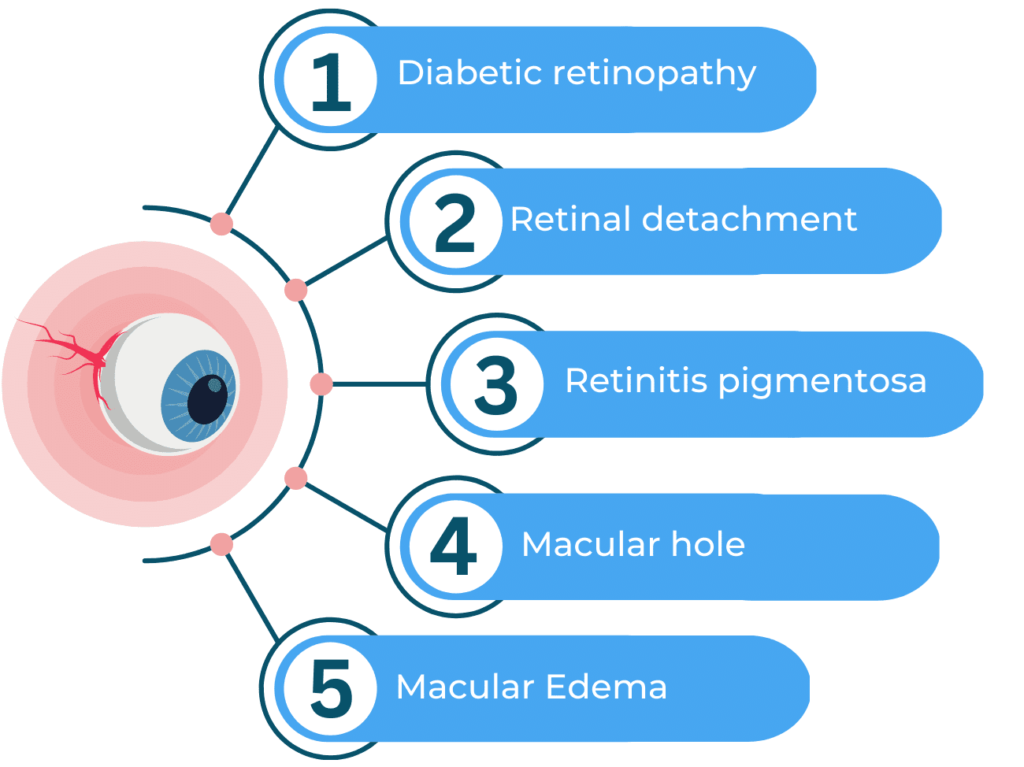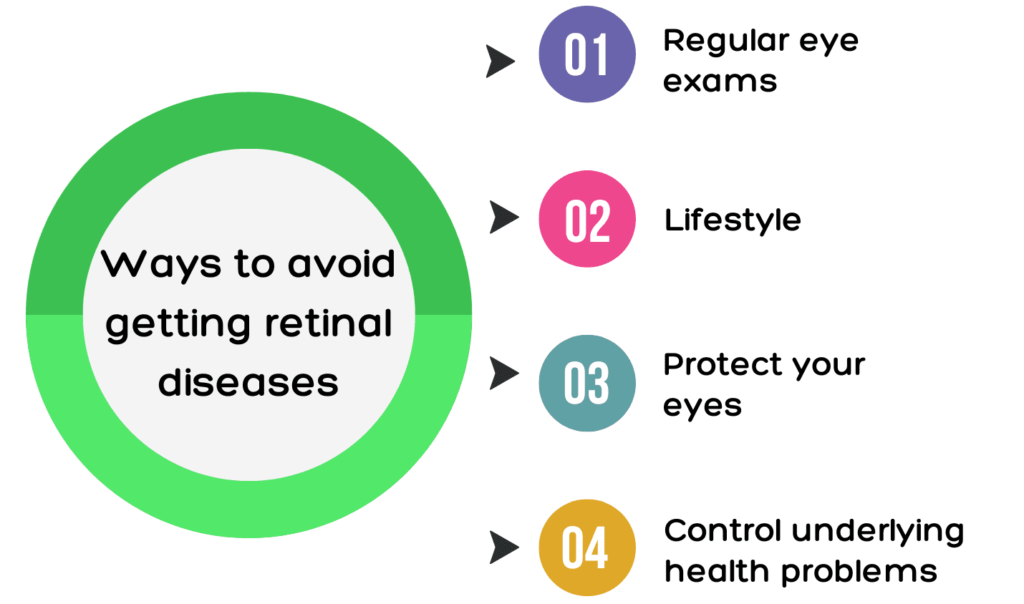
Dr. Aditya Sharma
MBBS, MS (Eye)
Specializations: Dry Eye, Keratoconus & Cornea Transplantation, Cataract Surgery, LASIK
Clinical Experience: 11 years
Total Surgeries to date: 31,580
Experience the services of the Best Retina Doctor in Jalandhar with a successful track record of treating thousands of Retina patients in a career of over ten years.
Our Retina Specialist will diagnose your Retinal problems at the most fundamental level and recommend the most effective treatment plan. The comfort, well-being & satisfaction of our Eye patients remains our top priority, with our uncompromising Patient-first approach.
Overview Of Retina Diseases
What is Retina: A thin layer of tissue towards the back of the human eye is called Retina. Human Retina has special cells called photoreceptors that pick up light and help form images sent to the brain. Often, diseases can hurt the Retina, making it hard to see or even causing Blindness.
Most common diseases of the Retina

Age-related macular degeneration (AMD) This condition affects the macula, which is part of the Retina in the centre that helps you see clearly in the centre of your field of Vision. AMD can make your Vision blurry or wavy, give you blind spots, and make it hard to see small details.
Diabetic retinopathy: Diabetes can lead to diabetic retinopathy; a condition wherein high blood sugar levels damage the blood vessels in the Retina. Diabetic retinopathy can cause vision loss, blurry Vision, and even Blindness.
Retinal detachment. Such a problem arises when the Retina pulls away from the back of the eye. Retinal detachment can make you suddenly lose sight, see flashing lights, or see floaters in your field of Vision.
Retinitis pigmentosa. This can happen out of a genetic disorder that causes the photoreceptor cells in the Retina to break down over time. This makes it hard to see at night and causes vision loss.
Macular hole: Another related disease is Macular Hole. This is a small hole that forms in the macula. It makes it hard to see fine details and can distort or blur your Vision.
Macular Edema: happens when fluid leaks into the macula, causing it to swell and make it hard to see.
Uveitis The uvea, which is the middle layer of the human eye & contains the iris, choroid, and ciliary body, are subjected to inflammation by uveitis. Such inflammation may produce eye pain, redness, impaired Vision, light sensitivity, and black floaters in one or both eyes.
Depending on the disease, medications, laser surgery, or other appropriate surgical procedures may be used to treat retina diseases. In addition, getting regular eye exams can help find and treat these problems.
What are the symptoms of Retina related eye diseases?
There are numerous retinal conditions, each with a unique set of symptoms. Nonetheless, the following list of retinal disease symptoms is typical:
- Distorted or blurry Vision.
- Reduction or total loss of peripheral Vision.
- Visual blind spot in the centre.
- Eye floaters – these are specks-like appearances known as floaters that move across your field of Vision.
- Light Flashes in the field of Vision.
- Poor Vision in low-light conditions.
- Colour vision distortions.
- Sudden decrease in eyesight.
Please note that if you or any of you know develops one or more of the above symptoms, you should consult an eye specialist for a thorough eye examination. Do not delay visiting a qualified eye specialist if you display these signs. Remember, Blindness or visual loss from retinal illnesses can be prevented with a timely diagnosis.
How to Diagnose Retinal diseases?
A complete eye exam, including several tests and procedures, can help determine if you have a retinal disorder. Here are some common ways to find out what’s wrong with the Retina:
- Visual Acuity Test: This test uses an eye chart to measure your Vision’s clarity. It can help you figure out if you are losing your sight.
Dilated Eye Exam: In this exam, eye drops are used to open up pupils. Then, your eye doctor will use a unique magnifying lens to examine your Retina. This test can help find any problems with the Retina.
- Optical Coherence Tomography (OCT): This test uses light waves to generate a sharp & detailed image of the Retina. It can help determine if the Retina’s thickness has changed or if the fluid has built up.
- Fluorescein Angiography: For this test, a dye is injected into a vein in your arm. The dye then goes to the blood vessels in your eyes. Pictures of the Retina are taken as the dye moves through the blood vessels. This can help find any problems with the blood vessels.
- Electroretinography (ERG): This test looks at how light affects the electrical activity of the Retina. It can help find out if any of the cells in the Retina are hurt.
Your Retinal Specialist may use one or more of these tests to determine if you have a problem with your Retina. In addition, several other tests and treatments could be considered, subject to diagnosis.
What is the Best Treatment for Retina Diseases?
Several different diseases can happen or target Retina. Hence the specific condition and the degree of the retinal illness determine the course of treatment. However, some of the typical approaches for treating Retinal diseases include:
Medication: Drugs such as anti-inflammatory medicines, steroids, or anti-VEGF agents can treat some retinal illnesses.
Laser therapy is a standard method of treating retinal diseases, including macular degeneration and diabetic retinopathy. The laser can assist in killing aberrant tissue, shrinking swollen areas, and sealing up blood vessel leaks.
Surgery: To cure retinal disorders, surgery may occasionally be required. For instance, retinal detachment necessitates urgent surgical repair to prevent irreversible visual loss.
Vitrectomy: During a vitrectomy, the eye’s vitreous humour is surgically removed and replaced with a clear solution. Retinal detachments and other severe retinal diseases are frequently treated with it.
PREVENTION: A retina specialist or ophthalmologist should be consulted for an accurate diagnosis and treatment strategy.
There are many ways to avoid getting retinal diseases, such as:

- Regular eye exams: Monitoring your eye health is the key; Hence Periodic eye check-ups help find early signs of retinal diseases so they can be treated and managed immediately.
- Lifestyle: Maintaining a healthy lifestyle, like working out regularly, eating a healthy diet high in antioxidants, and not smoking, can help prevent retinal diseases.
- Protect your eyes from the sun. Wearing sunglasses or a hat that blocks the sun’s damaging ultraviolet (UV) rays can help keep your Retina from getting hurt.
- Control underlying health problems: Diabetes and high blood pressure are two common underlying health conditions that can reduce your chances of retinal diseases.
Follow good eye hygiene. Things like washing your hands before touching your eyes can help stop the spread of infections that can cause retina diseases.
Talking to an eye doctor or other health professional about your risk factors and the best ways to protect yourself is essential.
FAQ:
Which age group is most likely to have problems with the Retina?
As our age progresses, one is likely to get retinal problems like age-related macular degeneration (AMD), diabetic retinopathy, and retinal detachment. So, people over 50 are most likely to have retina complications. But health problems like diabetes, high blood pressure, and genetics can also make it more likely for younger people to have retinal problems. So, for preventing and treating retinal issues, it’s essential to have regular eye exams and find them early on.
How much time does a Retina check-up take?
A retina check-duration ups on the tests needed, the reason for the exam, and the patient’s eye health. A regular retina check-up takes 30–60 minutes. Your eye doctor may dilate your pupils to examine your Retina, among other tests.
Retina examinations like OCT and fluorescein angiography take longer. Further testing or treatment may be needed if any abnormalities are found during the check-up, extending the visit time.
It’s wise to ask your eye doctor how long your retina check-up will take.
How to prevent a severe condition of Retinal detachment?
Retinal detachment is seen as a severe eye condition that can cause you to lose some or all of your Vision if you don’t get it treated. Even though you may not entirely be able to avoid getting a detached retina, there are some things you can do to make it less likely to happen:
- Regular eye exams: It’s essential to get regular eye exams, especially if you have a family history of retinal detachment or a high degree of myopia (near-sightedness). During a complete eye exam, your doctor can look for early signs of retinal detachment.
- Use of Eyewear: Protect your eyes by wearing safety glasses when you play sports or do other things that could hurt your eyes. Also, don’t rub your eyes too much or put too much pressure on them.
- Manage underlying conditions. If you are diabetic or hypertensive, taking care of these conditions properly is essential
- Monitor symptoms. Know the signs of retinal detachment, such as sudden flashes of light, floaters, or a shadow or curtain in your field of Vision. If you have any of these signs, you should immediately see a doctor.
- Get prompt treatment: If you experience retinal detachment, getting immediate treatment is essential to prevent vision loss. Subject to the severity of the detachment, your eye doctor may tell you to have surgery, laser therapy, or other treatments.
Meet Our Team
Our Eye Super specialists are qualified, skilled, and experienced to treat all eye diseases with best-in-class facilities & Medical equipment.

Dr. Sanjeev Duggal
MS ophthalmology

Dr. Mohit Ghai
Consultant Ophthalmologist



